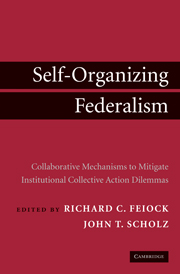 Self-Organizing Federalism
Self-Organizing Federalism Book contents
- Frontmatter
- Contents
- List of Figures
- List of Tables
- Contributors
- Preface
- PART ONE SELF-ORGANIZING VERSUS CENTRALIZED SOLUTIONS TO INSTITUTIONAL COLLECTIVE ACTION PROBLEMS: THEORETICAL CONSIDERATIONS
- 1 Self-Organizing Governance of Institutional Collective Action Dilemmas: An Overview
- 2 Can Consolidation Preserve Local Autonomy? Mitigating Vertical and Horizontal Dilemmas
- 3 The Institutional Collective Action Perspective on Self-Organizing Mechanisms: Market Failures and Transaction Cost Problems
- 4 Conflict, Power, and Irreconcilable Preferences: Some Limits to Self-Organizing Mechanisms
- PART TWO INTEGRATING METROPOLITAN SERVICE PROVISION: NETWORKS, CONTRACTS, AGREEMENTS, AND SPECIAL DISTRICTS
- PART THREE INTEGRATING REGIONAL POLICIES THROUGH NETWORKS, JOINT VENTURES, AND PARTNERSHIPS
- PART FOUR SELF-ORGANIZING GOVERNANCE AND INSTITUTIONAL COLLECTIVE ACTION
- References
- Index
4 - Conflict, Power, and Irreconcilable Preferences: Some Limits to Self-Organizing Mechanisms
from PART ONE - SELF-ORGANIZING VERSUS CENTRALIZED SOLUTIONS TO INSTITUTIONAL COLLECTIVE ACTION PROBLEMS: THEORETICAL CONSIDERATIONS
Published online by Cambridge University Press: 29 January 2010
- Frontmatter
- Contents
- List of Figures
- List of Tables
- Contributors
- Preface
- PART ONE SELF-ORGANIZING VERSUS CENTRALIZED SOLUTIONS TO INSTITUTIONAL COLLECTIVE ACTION PROBLEMS: THEORETICAL CONSIDERATIONS
- 1 Self-Organizing Governance of Institutional Collective Action Dilemmas: An Overview
- 2 Can Consolidation Preserve Local Autonomy? Mitigating Vertical and Horizontal Dilemmas
- 3 The Institutional Collective Action Perspective on Self-Organizing Mechanisms: Market Failures and Transaction Cost Problems
- 4 Conflict, Power, and Irreconcilable Preferences: Some Limits to Self-Organizing Mechanisms
- PART TWO INTEGRATING METROPOLITAN SERVICE PROVISION: NETWORKS, CONTRACTS, AGREEMENTS, AND SPECIAL DISTRICTS
- PART THREE INTEGRATING REGIONAL POLICIES THROUGH NETWORKS, JOINT VENTURES, AND PARTNERSHIPS
- PART FOUR SELF-ORGANIZING GOVERNANCE AND INSTITUTIONAL COLLECTIVE ACTION
- References
- Index
Summary
What are the effects of fragmented authority in metropolitan areas? This book focuses on one of these: how local governments and agencies can self-organize to obtain collective benefits of policy coordination when faced with uncertainty and commitment problems (Feiock and Scholz). It is claimed that the self-organizing development of institutions can reduce the “transaction costs” that prevent the resolution of institutional collective action (ICA) problems, but that the evolution of these institutions is dependent on the motivations of those involved to help develop and maintain the formal arrangements. Analysts in the past have indicated that transaction costs can be mitigated in the design stage, when authority is granted to governmental units. What is new about the approach articulated in this book is that costs also may be mitigated during a second, evolutionary phase in which networks of actors can operate to alter and overcome the transaction costs they have been given exogenously when the set of institutions operative in the metropolis were constructed formally.
Most important, the framework explicitly points toward the motivations of actors that basically cause evolutionary pressures on a decentralized governmental system. To understand emerging patterns of cooperation in what they call “self-organizing” institutions, Scholz and Feiock (Chapter 1) argue that instead of assuming that the shape of the institution is exogenously determined by some statutory authority and analyzing only the effects of that institution, we need to analyze the forces that generate institutional solutions to the ever-changing problems of fragmentation in the US federalist system.
- Type
- Chapter
- Information
- Self-Organizing FederalismCollaborative Mechanisms to Mitigate Institutional Collective Action Dilemmas, pp. 73 - 88Publisher: Cambridge University PressPrint publication year: 2009
- 3
- Cited by


